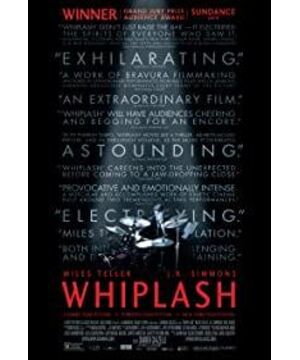The most special thing about "Whiplash" is that it breaks the traditional inspirational film "Strictly teaches good students" mode. When the audience's expectations step by step toward "the hero will succeed", it has deviated from the audience's expectations time and time again, instead creating layers of progressive suspense. The relationship between the protagonist as the "disciple" and the teacher as the "strict teacher" is constantly changing from the traditional way-the traditional relationship is confrontation-understanding-appreciation-mutual assistance, and in this film The relationship between the two is appreciation-understanding-confrontation-understanding-confrontation-appreciation?-confrontation?, even forming an endless loop between "confrontation-understanding-appreciation". The changes in their relationship are affected by the general environment. For example, when the hero has a new competitor, the relationship between the two becomes confrontation, because the teacher loves the winner more, and the hero is dissatisfied with the teacher's use of this aggressive method; For example, the protagonist had a car accident and was unable to complete the game but insisted on completing the game. In the end, the performance failed, the teacher's face was discredited, and the protagonist was forced to drop out of school. It can be said that the two of them did not help each other to grow up like the pattern of hundreds of inspirational films, but moved forward in the struggle against each other, and even let people see the genius potential of the male protagonist is indeed stimulated. Drumming itself is a very passionate thing, but there are too few tricks, simple procedures, rhythm, strength and speed. The lens can be strengthened, but it cannot be highlighted, because the lens should have completed this function. More importantly is the level of the play. The director relied on the unreasonable plots and the constant reversal of the relationship between the two to shoot the drums with a sword, which made adrenaline soar, so that he and the actor can get a sense of satisfaction in the sweaty drum beats. .
The film puts forward two values about "strict teachers produce good disciples". One is the extreme radical method of recognizing genius but not people represented by the teacher in the play. A play of "who goes wrong" shows his attitude vividly and vividly. The audience and the students were frightened and frowned, but he was immersed in his own world and felt that he had cultivated the best student (suicide saxophone player); the second is the traditional "just work hard The value of “do it” is encouraged and cultivated. This value does not have a centralized representative in the play, but it is scattered scattered among the actor, the actor’s girlfriend, the actor’s father, and the actor who later wants the actor to testify. The lawyer, and the audience like you and me. Because this is a more universal value, we presuppose it from the beginning of watching the show. So in the process of watching the movie, we ourselves can experience the collision of these two values. Like the leading actor and even the outstanding saxophonist who committed suicide, we had faith in the values of the teacher, and our traditional values were shaken. Although the film did not give a positive answer to the choice between these two values. It portrays the “geniuses” cultivated by the teacher’s values as tragic characters, including the male protagonist, but it undoubtedly recognizes this kind of values and recognizes what the teacher said, “If it’s not a genius, then he will The notion of "cannot continue" can be seen from the end of the actor's crazy and shocking personal show: the success it wants to talk about is extreme, and this kind of success also has its tragic beauty.
If the script of this play is drawn as a parabola, its apex part appears in three places: "The actor is out of draft and beats the drums", "The actor has a car accident-still insist on playing drums" and "The actor madly beats drums against the teacher". Among them, the actor’s car accident is the most shocking, because the audience’s expectation is that "the actor will definitely rush back and successfully complete the performance, so a car accident that will definitely interrupt his performance will not occur." However, a car accident happened; After the incident, the male protagonist crawled out of the car and insisted on going back to participate in the competition, and made a rhetoric: "If you can't finish it, you can finish it." The audience's expectation was re-established as "He can grit his teeth and create miracles", but it didn't. The more he failed, he finally fell directly to the ground, dropped out of school, and was defeated. In "Kano", there is also a similar paragraph, that is, in the last and most important game, the male protagonist's right hand was injured, and every attempt and effort only resulted in failure. But there are essential differences between the two. "Kano" is a typical protagonist's halo. It is to find an excuse to tell the audience that this team did not get "the best" by mistake. Although they lost, they actually It is still "the best"; "Whiplash" just throws the question to the audience for reflection, why does the actor insist on doing this? Does his persistence make sense? Just like the whole film wants to ask everyone, even if you know that becoming a genius is tragic, are you willing to stick to it?
The significance of "Whiplash"'s critical acclaim is that it proposes a new direction of exploration for inspirational films. It is true that the turning point in the play is too large, which may make the audience who are used to the routine of inspirational films unable to keep up and wonder. The several transitions seem to be the "fairy rescue" routine adopted when the script is written to desperate, but in fact it is reasonable and the most common and most serious external factors encountered in reality. That is, the reality that exists contradictory. The protagonist does not need to succeed or find a step to become the "uncrowned king". Even the persistence of the characters in the play is controversial. As long as there is flesh and blood and the values are thrown powerfully, the audience can expand empathy and tolerance to understand it. This kind of inspirational effect is more likely to arouse people in the cruel reality.
View more about Whiplash reviews











